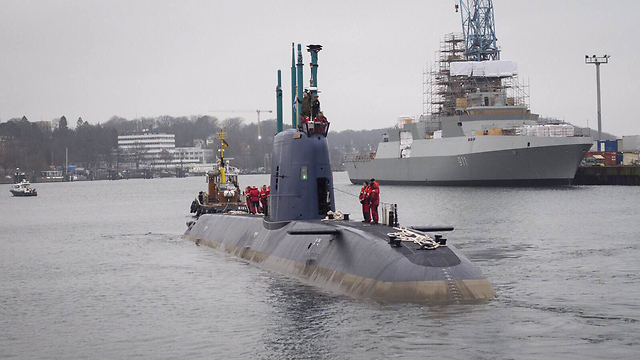Analysis: According to the different responses to the submarine affair, Israel’s defense officials were unaware of the Iranian representative on the German company’s board; It is likely, therefore, that the confidentiality agreements did not prevent him from obtaining information.
The Defense Ministry’s response to the submarine affair is astonishing and surprising: “Defense Ministry officials said in response that they were unaware of any Iranian involvement in the company.”
Are Defense Ministry officials familiar with Google? All they have to do is type in two words – ThyssenKrupp and Iran – and they will become aware of Iranian involvement in the company. You’re welcome to try this at home rather than pay imaginary sums of money, like the State of Israel is doing, and the Defense Ministry in particular, for secret intelligence activities aimed at uncovering countries and companies with trade ties to Iran.

These activities take place in order to lead to the severance of such trade ties, and they have been successful in the past and are still in the present. An invisible hand transfers the information to countries and media outlets around the world. The State of Israel has created organized supervision mechanisms within the Defense Ministry to prevent such incidents.
This background demonstrates the failure of both the Israeli government and the Defense Ministry, especially the Director of Security of the Defense Establishment (Malmab), as well as the Mossad and the Navy. Even if we believe security sources in Israel who say that the core of the secret in the submarines’ production was not exposed – although this statement is difficult to trust either – the issue of forbidden trade between the State of Israel and Iran, as well as the Israeli preventive measures, are the great and serious failure in this case.
The Prime Minister’s Office did not offer an official response to the report. Nevertheless, according to a senior government worker in Jerusalem, Prime Minister Benjamin Netanyahu was quoted as saying that the National Security Council and the Defense Ministry were unaware of the Iranian partnership. According to the source, the talks with the shipyard were conducted by the Defense Ministry and the Navy, and that like in any security purchase deal with a foreign company, the Malmab conducted a preliminary check. The senior source added that Defense Ministry officials estimate there was no danger of classified information being leaked to Iran.
Addressing this response, one could say that if the Malmab conducted a preliminary check and did not know about an Iranian involvement in ThyssenKrupp, it’s extremely concerning and alarming, and if the Malmab did know about an Iranian involvement and decided that there was no danger of classified information being leaked to Iran, that rings warning bells too. An Iranian landlord is not something that can be downplayed.
Defense Ministry officials are relying upon the non-disclosure agreement between Israel and the German shipyards, which explicitly defines the data protection procedures related to the Israeli activity. But it’s not so simple when we remember that the Iranian deputy economy and international relations minister was a member of ThyssenKrupp’s board until 2005. In other words, the Iranian representative sat in the corporation’s board meetings when the submarines were ordered from the company, and it’s very likely that any demand made by him to receive information would have been granted.
This is not the case of a public which buys shares in the stock market and is only exposed to information that the listed company reports to the public. This is a representative who sat on the company’s board in the same period when Israel ordered the submarines – one of its most classified projects.
According to the slew of reactions received so far, the defense establishment and the Malmab were completely unaware of the fact that there was an Iranian on the company’s board, and it is therefore likely that the confidentiality agreements did not prevent him from obtaining information. Add that to the report on the Haaretz website that the Iranian government-owned company made hundreds of millions from the ThyssenKrupp corporation over the years. It should be noted that in the past its holdings were higher than 5 percent, and so it raked in high sums.
In light of all this, there is no escape from accepting the recommendation of Amos Gilad, director of policy and political military affairs at the Defense Ministry, to look into the issue in the first stage and maybe even launching an investigation.
As reported by Ynetnews
